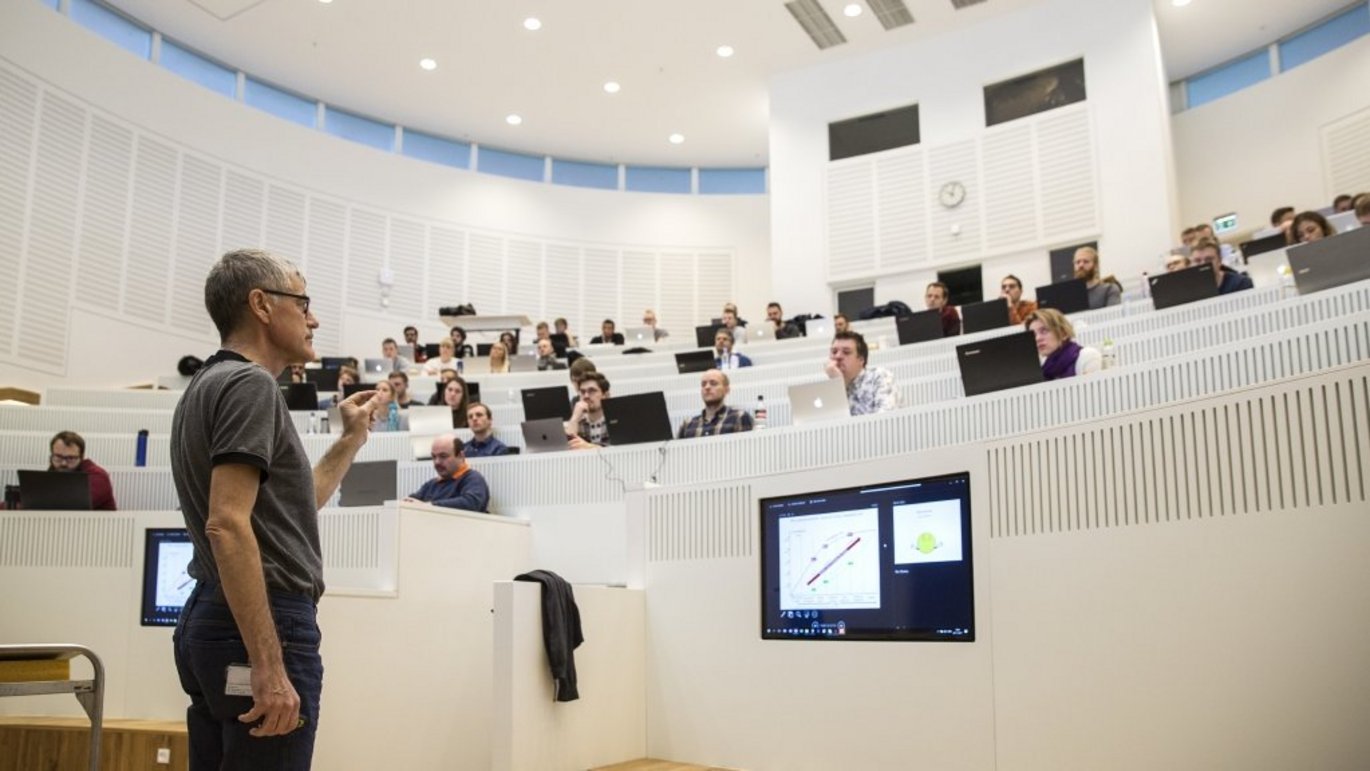The teacher identity under digital pressure
The 'new normal' has become digital. But how does this affect teaching? A study on digital and remote teaching formats reveals a number of challenges for academics’ teacher identities. Therefore, universities must carefully consider how they can support sustainable and adaptive teacher identities that are compatible with the increasing digitisation.


The COVID-19 pandemic redefined how we understand teaching. Many studies have shown that the students’ learning and well-being were significantly affected by digital and ‘remote’ teaching formats via platforms such as Zoom, Skype, and Teams. The ‘new normal’ became digital. This disruption of the students’ and not least the teachers’ practice has given rise to new insights into the dynamic interaction between students and teachers.
Mette Krogh Christensen from the CED is an associate professor and, among other things, she researches ‘embodied teaching’. Her research indicates that the university teachers’ identity has been affected by the ‘new normal’.
"First of all, an academic’s teacher identity serves as an organising element in professional and didactic decision-making. Secondly, the teachers are key players in facilitating students’ learning environments – both digitally and on campus. Thirdly, a teacher’s identity is closely linked to motivation, a sense of self, and job satisfaction,” she emphasises.
What does the research tell us?
In the scientific study from 2022 involving other researchers from Aarhus University and the University of Southern Denmark, she studied from a sociocultural perspective how the dramatic change in the teaching contexts during COVID-19 influenced the teacher identity. Among other approaches, the study included qualitative interviews with 19 experienced university teachers from health sciences educations – 11 from AU and eight from the University of Southern Denmark.
“The results indicated that a form of practically embodied teacher identity constitutes a basic condition and a resource for the teachers. This means that an agelong experience with varying on-campus educational contexts has become practically embodied and thereby an internalised knowledge, that is, a practical sense. In this way, the practical sense is a form of identity that the teachers use to navigate,” she says.
The study concludes that the sudden change in the basic conditions of the teaching context – from on-campus to digital – has created a significant experience of loss of the practically embodied teacher identity. The experience of loss of teacher identity is related to three dimensions of teaching:
- a lack of sense of the atmosphere and activity in the classroom
- an absence of non-verbal feedback from students
- a loss of mutual visual contact between the students and the teacher.
According to Mette Krogh Christensen, the consequence thereof was that the teachers felt precluded from adapting the teaching to their students’ needs during the class.
“A sense of how the students feel and how they are participating during the teaching turned out to be a crucial didactic resource for the teachers. A consequence was that the teachers experienced decreased motivation, a broken sense of self, and reduced job satisfaction,” she says.
Future perspectives for digitised teaching
Therefore, the researchers behind the study conclude that universities should carefully consider how they can support sustainable and adaptive teacher identities that are compatible with the increasing digitisation of teaching environments. The study has shown that teaching is an activity that includes embodied, sensory, and emotional aspects and that the teacher identity is sensitive to the structural changes at the universities.
“Furthermore, the study highlights an overlooked basic condition in teaching, namely that teachers use their practical sense to navigate, qualify, and adjust their teaching to the students. The actual use of practical sense seems to be highly motivating for the teachers and contributes to their sense of appreciation, connectedness, competence, commitment, and how the teacher imagines a future career trajectory,” Mette Krogh Christensen concludes.
Read more about the research initiative
This study is part of a research initiative about continuing professional development and embodied teaching in health sciences education. The first article entitled “Embodied teacher identity: a qualitative study on ‘practical sense’ as a basic pedagogical condition in times of Covid‑19” was published in 2022 and you can read more here:
- Christensen, M.K., Nielsen, KJ.S. & O’Neill, L.D. Embodied teacher identity: a qualitative study on ‘practical sense’ as a basic pedagogical condition in times of Covid-19. Adv in Health Sci Educ 27, 577–603 (2022). https://doi.org/10.1007/s10459-022-10102-0
If you would like to know more about the research initiative, you can click here, or contact Associate Professor Mette Krogh Christensen at mette.k.christensen@au.dk or tel. + 45 93 50 90 38.
[Update per 04.10.2023] You can also read Mette Krogh Christensen's contribution to the debate,'Ubehagelig udvikling', in Danish in Dansk Universitetspædagogisk Tidsskrift.
The research results – more information
ITEM | CONTENT AND PURPOSE |
Type of study | Qualitative interviews with 19 university teachers. |
External collaborators | The University of Southern Denmark. |
External funding | The study has not received any external funding. |
Conflict of interest | The authors have no conflicts of interest. |
Link to the scientific article | |
Contact information | Associate Professor Mette Krogh Christensen, the Centre for Educational Development, Aarhus University. Email: mette.k.christensen@au.dk |
